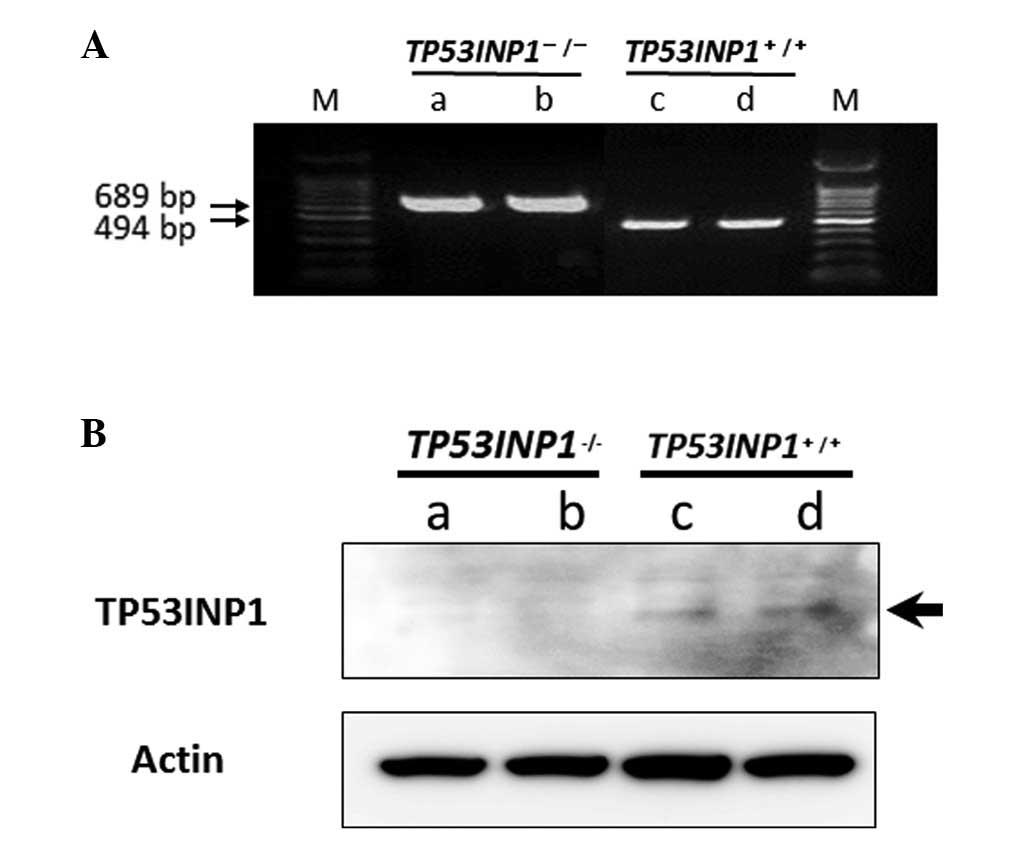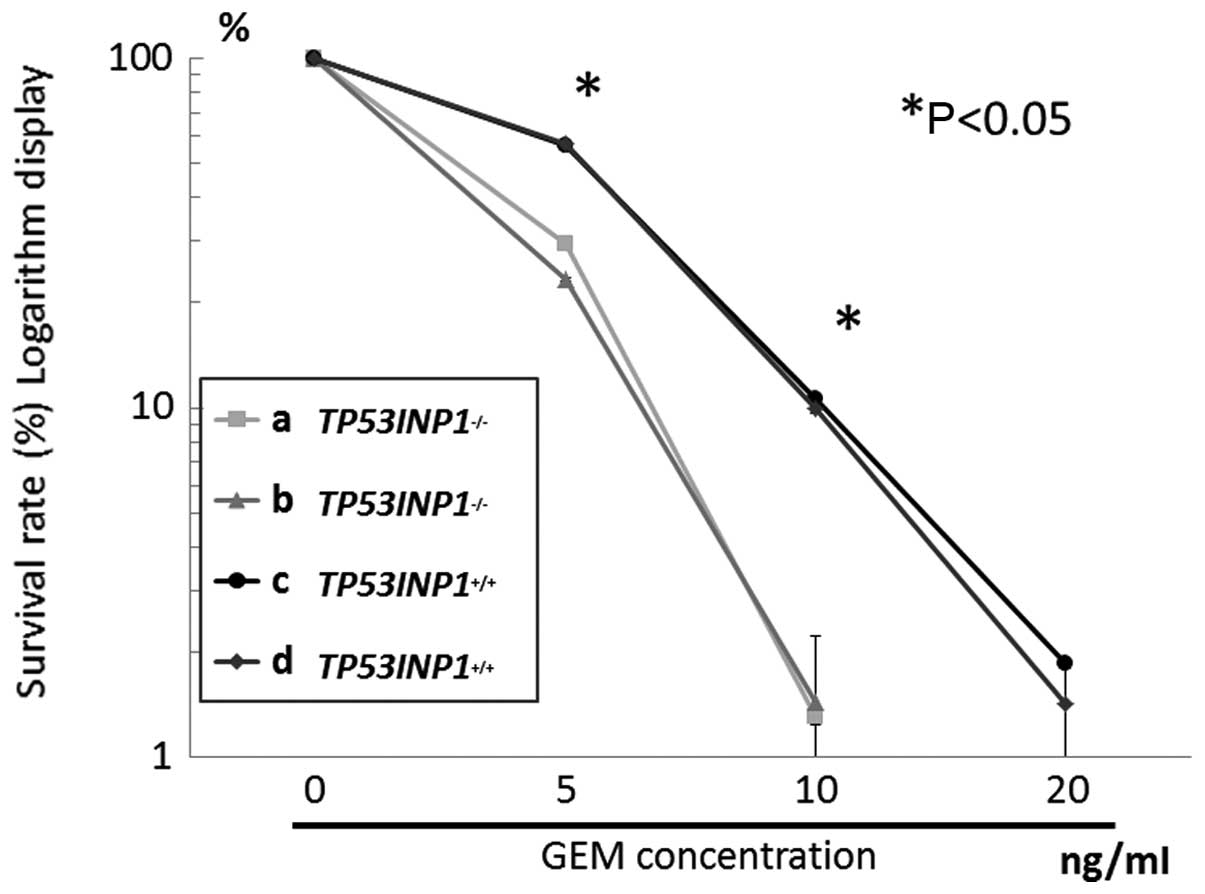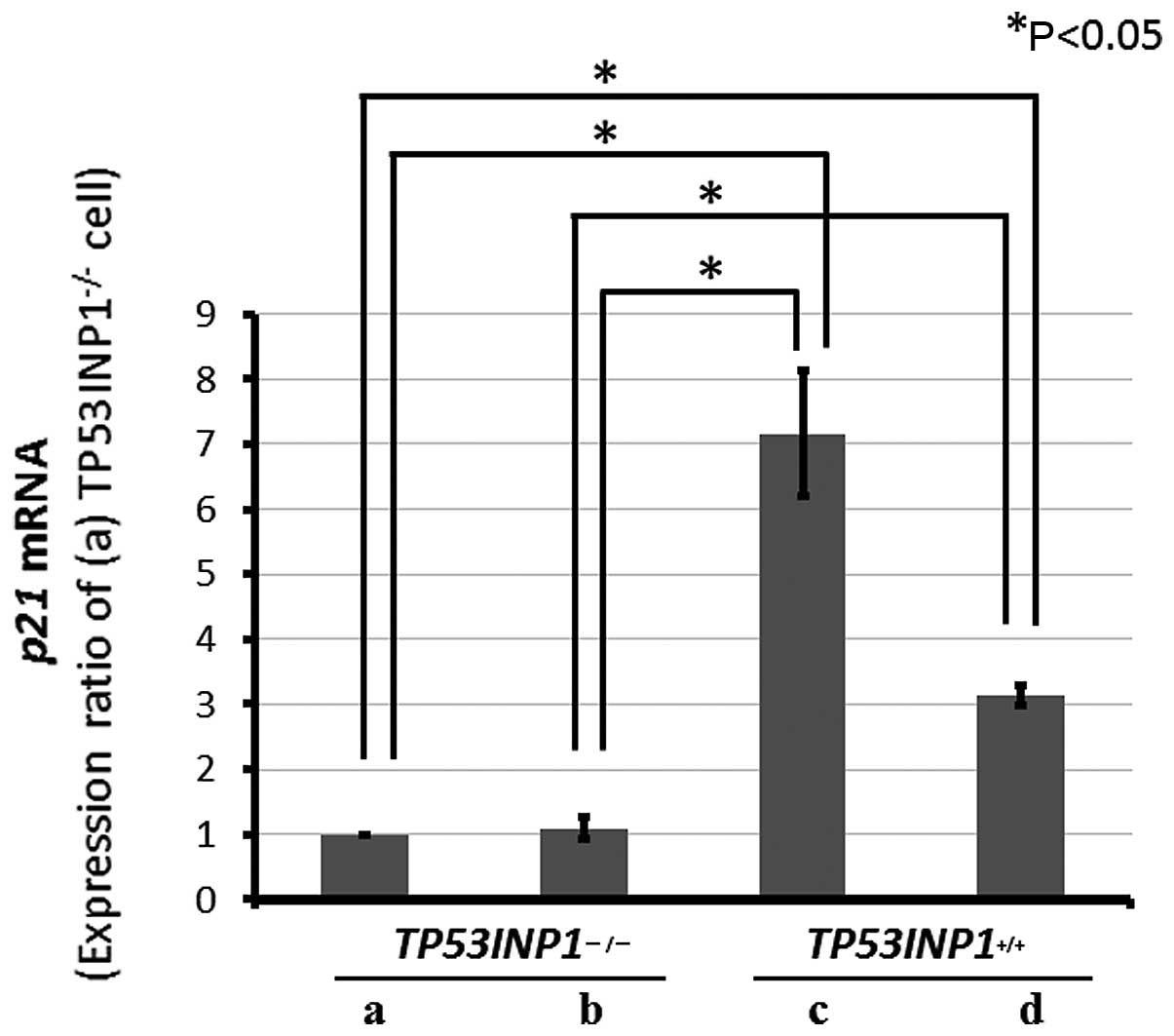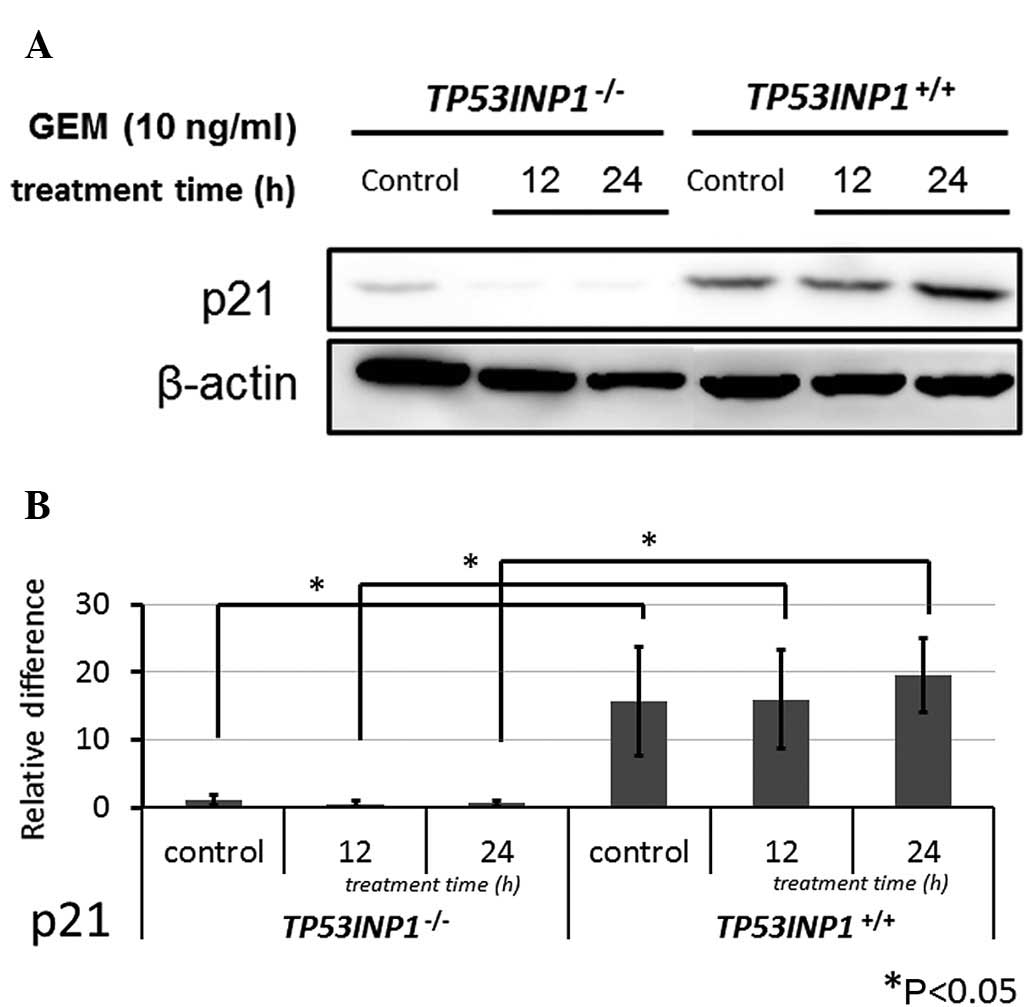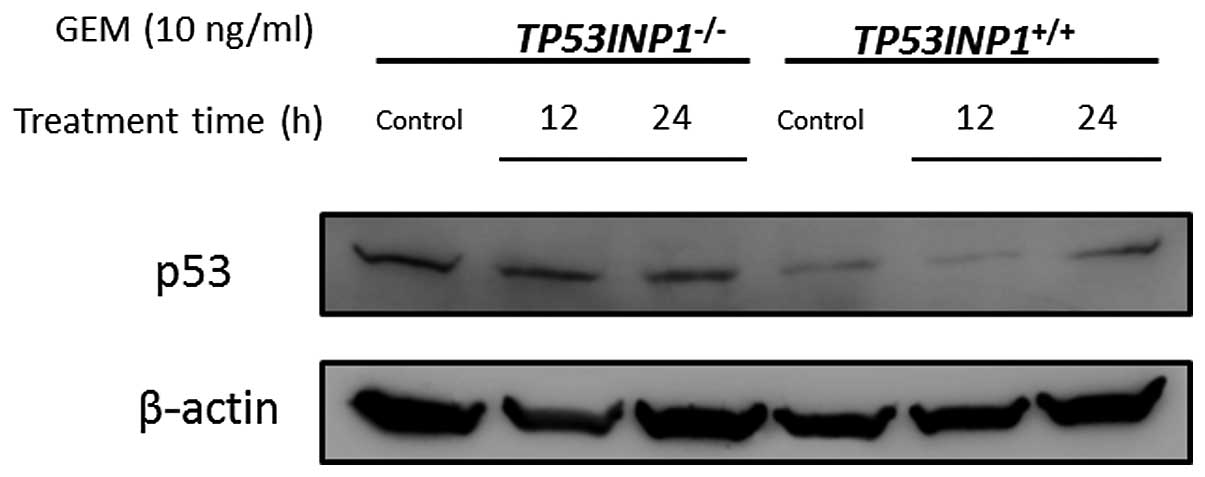|
1.
|
Vincent A, Herman J, Schulick R, Hruban RH
and Goggins M: Pancreatic cancer. Lancet. 378:607–620. 2011.
|
|
2.
|
Hezel AF, Kimmelman AC, Stanger BZ,
Bardeesy N and Depinho RA: Genetics and biology of pancreatic
ductal adenocarcinoma. Genes Dev. 20:1218–1249. 2006.
|
|
3.
|
Di Marco M, Di Cicilia R, Macchini M,
Nobili E, Vecchiarelli S, Brandi G and Biasco G: Metastatic
pancreatic cancer: Is gemcitabine still the best standard
treatment? Oncol Rep. 23:1183–1192. 2010.
|
|
4.
|
Huang P, Chubb S, Hertel LW, Grindey GB
and Plunkett W: Action of 2′,2′-difluorodeoxycytidine on DNA
synthesis. Cancer Res. 51:6110–6117. 1991.
|
|
5.
|
Gandhi V, Mineishi S, Huang P, Yang Y,
Chubb S, Chapman AJ, Nowak BJ, Hertel LW and Plunkett W:
Difluorodeoxyguanosine: cytotoxicity, metabolism, and actions on
DNA synthesis in human leukemia cells. Semin Oncol. 22:61–67.
1995.
|
|
6.
|
Heinemann V, Xu YZ, Chubb S, Sen A, Hertel
LW, Grindey GB and Plunkett W: Inhibition of ribonucleotide
reduction in CCRF-CEM cells by 2′,2′-difluorodeoxycytidine. Mol
Pharmacol. 38:567–572. 1990.
|
|
7.
|
Keim V, Iovanna JL and Dagorn JC: The
acute phase reaction of the exocrine pancreas. Gene expression and
synthesis of pancreatitis-associated proteins. Digestion. 55:65–72.
1994.
|
|
8.
|
Xie MJ, Motoo Y, Iovanna JL, Su SB,
Ohtsubo K, Matsubara F and Sawabu N: Overexpression of
pancreatitis-associated protein (PAP) in human pancreatic ductal
adenocarcinoma. Dig Dis Sci. 48:459–464. 2003.
|
|
9.
|
Motoo Y, Satomura Y, Mouri I, Mouri H,
Ohtsubo K, Sakai J, Fujii T, Taga H, Yamaguchi Y, Watanabe H, et
al: Serum levels of pancreatitis-associated protein in digestive
diseases with special reference to gastrointestinal cancers. Dig
Dis Sci. 44:1142–1147. 1999.
|
|
10.
|
Su SB, Motoo Y, Iovanna JL, Xie MJ and
Sawabu N: Effect of camostat mesilate on the expression of
pancreatitis-associated protein (PAP), p8, and cytokines in rat
spontaneous chronic pancreatitis. Pancreas. 23:134–140. 2001.
|
|
11.
|
Nowak J, Tomasini R, Mattei MG, Azizi
Samir LA, Dagorn JC, Dusetti N, Iovanna JL and Pébusque MJ:
Assignment of tumor protein p53 induced nuclear protein 1
(TP53INP1) gene to human chromosome band 8q22 by in situ
hybridization. Cytogenet Genome Res. 97:140E2002.
|
|
12.
|
Tomasini R, Samir AA, Pebusque MJ, Calvo
EL, Totaro S, Dagorn JC, Dusetti NJ and Iovanna JL: P53-dependent
expression of the stress-induced protein (SIP). Eur J Cell Biol.
81:294–301. 2002.
|
|
13.
|
Okamura S, Arakawa H, Tanaka T, Nakanishi
H, Ng CC, Taya Y, Monden M and Nakamura Y: p53DINP1, a
p53-inducible gene, regulates p53-dependent apoptosis. Mol Cell.
8:85–94. 2001.
|
|
14.
|
Gironella M, Seux M, Xie MJ, Cano C,
Tomasini R, Gommeaux J, Garcia S, Nowak J, Yeung ML, Jeang KT, et
al: Tumor protein 53-induced nuclear protein 1 expression is
repressed by miR-155, and its restoration inhibits pancreatic tumor
development. Proc Natl Acad Sci USA. 104:16170–16175. 2007.
|
|
15.
|
Jiang PH, Motoo Y, Sawabu N and Minamoto
T: Effect of gemcitabine on the expression of apoptosis-related
genes in human pancreatic cancer cells. World J Gastroenterol.
12:1597–1602. 2006.
|
|
16.
|
Möller A, Sirma H, Hofmann TG, Rueffer S,
Klimczak E, Dröge W, Will H and Schmitz ML: PML is required for
homeodomain-interacting protein kinase 2 (HIPK2)-mediated p53
phosphorylation and cell cycle arrest but is dispensable for the
formation of HIPK domains. Cancer Res. 63:4310–4314. 2003.
|
|
17.
|
Yoshida K, Liu H and Miki Y: Protein
kinase C delta regulates Ser46 phosphorylation of p53 tumor
suppressor in the apoptotic response to DNA damage. J Biol Chem.
281:5734–5740. 2006.
|
|
18.
|
Gommeaux J, Cano C, Garcia S, Gironella M,
Pietri S, Culcasi M, Pébusque MJ, Malissen B, Dusetti N, Iovanna J
and Carrier A: Colitis and colitis-associated cancer are
exacerbated in mice deficient for tumor protein 53-induced nuclear
protein 1. Mol Cell Biol. 27:2215–2228. 2007.
|
|
19.
|
Harvey M, Sands AT, Weiss RS, Hegi ME,
Wiseman RW, Pantazis P, Giovanella BC, Tainsky MA, Bradley A and
Donehower LA: In vitro growth characteristics of embryo
fibro-blasts isolated from p53-deficient mice. Oncology.
8:2457–2467. 1993.
|
|
20.
|
Jiang PH, Motoo Y, Garcia S, Iovanna JL,
Pébusque MJ and Sawabu N: Down-expression of tumor protein
p53-induced nuclear protein 1 in human gastric cancer. World J
Gastroenterol. 12:691–696. 2006.
|
|
21.
|
Cano CE, Gommeaux J, Pietri S, Culcasi M,
Garcia S, Seux M, Barelier S, Vasseur S, Spoto RP, Pébusque MJ, et
al: Tumor protein 53-induced nuclear protein 1 is a major mediator
of p53 antioxidant function. Cancer Res. 69:219–226. 2009.
|
|
22.
|
Niculescu AB III, Chen X, Smeets M, Hengst
L, Prives C and Reed SI: Effects of p21Cip1/Waf1) at both the G1/S
and the G2/M cell cycle transitions: pRb is a critical determinant
in blocking DNA replication and in preventing endoreduplication.
Mol Cell Biol. 18:629–643. 1998.
|
|
23.
|
Xia QS, Ishigaki Y, Zhao X, Shimasaki T,
Nakajima H, Nakagawa H, Takegami T, Chen ZH and Motoo Y: Human
SMG-1 is involved in gemcitabine-induced primary microRNA-155/BIC
up-regulation in human pancreatic cancer PANC-1 cells. Pancreas.
40:55–60. 2011.
|















